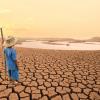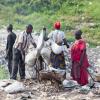
Human-induced climate change is causing dangerous and widespread disruption in nature and affecting the lives of billions of people around the world, despite efforts to reduce the risks. People and ecosystems least able to cope are being hardest hit, according to the latest Intergovernmental Panel on Climate Change (IPCC) report, released today.
The IPCC Working Group II report examines the impacts of climate change on nature and people around the globe. It explores future impacts at different levels of warming and the resulting risks, and offers options to strengthen nature and society’s resilience to ongoing climate change; to fight hunger, poverty, and inequality; and to ensure that Earth remains a place worth living on for current as well as for future generations.
The report introduces several new components: One is a special section on climate change impacts, risks and options to act for cities and settlements by the sea, tropical forests, mountains, biodiversity hotspots, dryland and deserts, the Mediterranean, as well as the Polar Regions. Another is an atlas that will present data and findings on observed and projected climate change impacts and risks from global to regional scales, thus offering even more insights for decision makers.
“This report is a dire warning about the consequences of inaction,” said Hoesung Lee, Chair of the IPCC. “It shows that climate change is a grave and mounting threat to our wellbeing and a healthy planet. Our actions today will shape how people adapt and how nature responds to increasing climate risks.”
IIASA Systemic Risk and Resilience Research Group Leader, Reinhard Mechler, is a lead author on Chapter 17 of the report, which focuses on decision-making options for managing risk. Mechler, whose work for the IPCC focusses on how climate risk management and adaptation help to reduce and address the risks to society and ecosystems across the globe, also contributed to the summary for policymakers, which was approved by 195 member governments of the IPCC on Sunday, 27 February 2022, through a virtual approval session held over two weeks. His work includes assessments of methods and tools to support planning and implementation, governance issues, and the international dimension with regard to policy dialogue on adaptation and Loss and Damage.
“The cumulative scientific evidence of this report is indisputable: climate change is a threat to human wellbeing and the health of the planet. This report builds on the messages of previous IPCC reports, showing that climate impacts and risks are proliferating at specific levels of global warming. While action on adaptation (and mitigation) is being taken across the world, there are growing gaps with regard to avoiding and reducing risks, as well as dealing with unavoided and unavoidable impacts and risks. Adaptation limits will soon be reached in both natural and human systems without urgent action on adaptation and Loss and Damage. The 1.5°C global ambition on climate mitigation is real: beyond this warming level, impacts and risks will become increasingly existential and irreversible,” says Mechler.
The report recognizes the interdependence of climate, biodiversity and people and integrates natural, social, and economic sciences more strongly than earlier IPCC assessments, while also emphasizing the urgency of immediate and more ambitious action to address climate risks.
The authors emphasize that safeguarding and strengthening nature is key to securing a livable future and that there are options to adapt to a changing climate. In this regard, the report provides new insights into nature’s potential not only to reduce climate risks but also to improve people's lives.
Scientists further point out that climate change interacts with global trends such as unsustainable use of natural resources, growing urbanization, social inequalities, losses and damages from extreme events and a pandemic, jeopardizing future development.
“Our assessment clearly shows that tackling all these different challenges involves everyone – governments, the private sector, and civil society – working together to prioritize risk reduction, as well as equity and justice, in decision making and investment,” said IPCC Working Group II Co-Chair Debra Roberts. “In this way, different interests, values and world views can be reconciled. By bringing together scientific and technological know-how, as well as indigenous and local knowledge, solutions will be more effective. Failure to achieve climate resilient and sustainable development will result in a sub- optimal future for people and nature.”
Climate change is a global challenge that requires local solutions, which is why the Working Group II contribution to the IPCC’s Sixth Assessment Report (AR6) provides extensive regional information to enable Climate Resilient Development. The report clearly states that Climate Resilient Development is already challenging at current warming levels and this will become more limited if global warming exceeds 1.5°C (2.7°F). In some regions, it will be impossible if global warming exceeds 2°C (3.6°F). This key finding underlines the urgency for climate action, focusing on equity and justice. Adequate funding, technology transfer, political commitment, and partnership lead to more effective climate change adaptation and emissions reductions.
“Action on climate change is inextricably linked to action on other global challenges. It is important to note that pursuing climate resilience development pathways will also create opportunities ̶ rapid urban growth, for instance, presents a time-limited opportunity to achieve climate resilient and sustainable development. The benefits would be felt in more rural areas as well through stronger supply chains and financial flows,” notes Mechler. “A healthy planet is fundamental to climate resilient development. Biodiversity and ecosystem services have limited capacity to adapt to increasing global warming levels, which will make climate resilient development progressively harder to achieve beyond 1.5°C warming. Maintaining the resilience of biodiversity and ecosystem services at a global scale depends on effective and equitable conservation of approximately 30% to 50% of Earth’s land, freshwater, and ocean areas, including currently near-natural ecosystems,” he concludes.
Further information
The Summary for Policymakers of the Working Group II contribution to the Sixth Assessment Report (AR6) as well as additional materials and information are available at https://www.ipcc.ch/report/ar6/wg2/
News

05 June 2024
The 2024 State of CDR Report: Scaling up CO2 removal to meet Paris Targets

23 April 2024
US Permanent Representative to International Organizations in Vienna visits IIASA

15 April 2024

